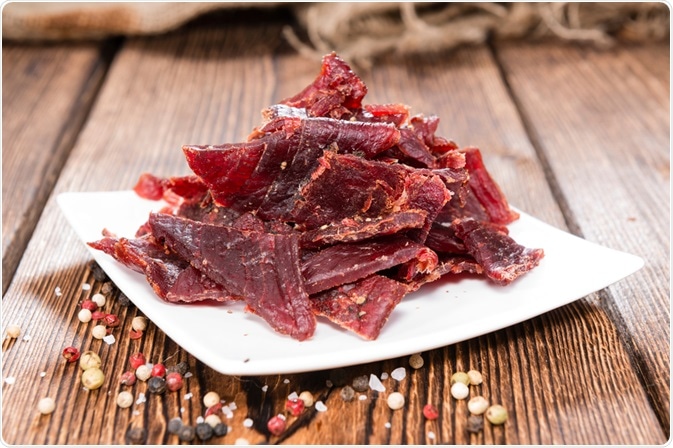Over recent years, several studies have highlighted the link between eating beef jerky (or other nitrated meat products) and the incidence of psychosis or mania.

Image Credit: HandmadePictures/Shutterstock.com
A recent 2020 study has emphasized this link, demonstrating that it can contribute to mania pathogenesis. This finding may help develop new therapeutic approaches to psychosis.
Environmental influence on mania
Mania is a neuropsychiatric condition characterized by an elevated mood, increased feelings of self-esteem, increased goal-directed activities, reduced sleep requirements, trouble maintaining attention, and often, feelings of euphoria.
Periods of the abnormal mood state which can last for days or longer define bipolar disorder, a psychological illness that has high rates of morbidity and mortality.
Over the decades, many studies have investigated the underlying mechanisms that contribute to the initiation and development of this disease.
While a wealth of data has uncovered the genetic risk factors at play, highlighting its heritability, twin studies have helped to reveal that genetics are not 100% at the root of bipolar disorder, meaning that other risk factors play a part.
A growing number of studies have suggested that different kinds of environmental exposures can influence mania, as well as other mental illnesses. Recently, scientists have been focusing on the role of diet in mental illness, which has already uncovered some key findings, such as the role of certain food groups in managing anxiety, depression, and autism.
Eating habits can influence psychiatric disorders via numerous routes, such as through neurotoxicity as a result of dietary exposure to heavy metals, changes in the gut microbiome which impact the gut-brain axis, the metabolism of substances such as tryptophan and kynurenine which act as neuroactive intermediates, and the consumption of inflammatory foods.
There is a wealth of data that documents various relationships between diet and psychology.
In the last few years, diet has also been highlighted as a possible contributing factor to bipolar disorder, and in particular, the manic phases that characterize it.
Could eating beef jerky induce mania?
In 2018, scientists at Johns Hopkins University conducted a study in which they analyzed over 1,000 participants who either had a psychiatric disorder or did not.
They explored data collected over a decade, between 2007 and 2017, and found that those who had been hospitalized for mania were 3.5 times more likely than those without a psychiatric disorder to have consumed cured meat before hospitalization. They found no other foods to show any links between consumption, and hospitalization with mania.
Cured meats are processed using chemicals called nitrates. Food items such as beef jerky, hot dogs, salami, pepperoni, pancetta, and more, are all examples of foods that have been processed with nitrates. The findings of the 2018 study were unsurprising to scientists as this particular food group had already been associated with other illnesses such as cancer and neurodegenerative diseases.
Some studies have even indicated that eating these kinds of food while pregnant may increase the risk of childhood brain cancer. It is now believed that they may also contribute to mania.
Another study found similar results, demonstrating that diets that included nitrated dry-cured meats (and no other meat or fish products) were strongly related to current mania in patients. They did not find any such associations between the consumption of other meat or fish and mania. A history of eating cured meats was significantly and independently related to mania, also, it was found to be linked to other psychiatric disorders, but the links here were less strong.
The team further explored this association by feeding meat to rats that had nitrate added to it. They observed that nitrate-rich food caused the rats to behave like that of a person experiencing mania. They witnessed hyperactivity in the animals that are characteristic of manic episodes.
These findings strongly imply that mania may result from altered brain pathways and adjusted intestinal microbiota, which can be influenced by consuming cured meats.
The development of novel therapeutic interventions
Further work is needed to fully explore this association between cured meats and mania. Growing our knowledge of this relationship is likely to lead to new therapeutic approaches to bipolar disorder and mania, as well as developing effective preventative methods for those vulnerable to the psychiatric disorder.
Given that bipolar disorder affects roughly 1 to 3% of the US population and costs around $25 annually in healthcare fees, the potential to develop new and more effective therapies and preventative techniques could significantly improve the quality of life of a large number of people, as well as reducing their healthcare bills.
Simply reducing the amount of cured meats eaten could be a simple and cost-effective method in managing mania in some people.
The next step will be to look closer at the underlying mechanisms involved in this link between cured meats and mania. Currently, it is not clear how the nitrates used to process the meats impacts the brain, inducing manic episodes in vulnerable people.
Sources:
- Cloutier, M., Greene, M., Guerin, A., Touya, M., and Wu, E., 2018. The economic burden of bipolar I disorder in the United States in 2015. Journal of Affective Disorders, 226, pp.45-51. www.sciencedirect.com/.../S0165032717315100?via%3Dihub#!
- Khambadkone, S., Cordner, Z., Dickerson, F., Severance, E., Prandovszky, E., Pletnikov, M., Xiao, J., Li, Y., Boersma, G., Talbot, C., Campbell, W., Wright, C., Siple, C., Moran, T., Tamashiro, K. and Yolken, R., 2018. Nitrated meat products are associated with mania in humans and altered behavior and brain gene expression in rats. Molecular Psychiatry, 25(3), pp.560-571. www.nature.com/.../s41380-018-0105-6
- Nielsen, S., Mueller, B., Preston-Martin, S., Farin, F., Holly, E. and McKean-Cowdin, R., 2011. Childhood Brain Tumors and Maternal Cured Meat Consumption in Pregnancy: Differential Effect by Glutathione S-Transferases. Cancer Epidemiology Biomarkers & Prevention, 20(11), pp.2413-2419. https://www.ncbi.nlm.nih.gov/pmc/articles/PMC3397426/
Further Reading